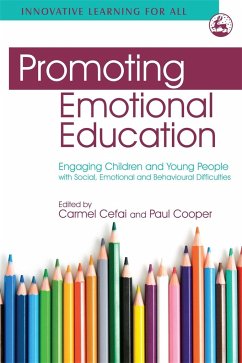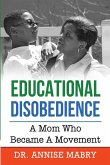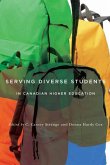Promoting Emotional Education
Engaging Children and Young People with Social, Emotional and Behavioural Difficulties
Herausgeber: Cooper, Paul; Cefai, Carmel
Promoting Emotional Education
Engaging Children and Young People with Social, Emotional and Behavioural Difficulties
Herausgeber: Cooper, Paul; Cefai, Carmel
- Broschiertes Buch
- Merkliste
- Auf die Merkliste
- Bewerten Bewerten
- Teilen
- Produkt teilen
- Produkterinnerung
- Produkterinnerung
This book suggests adopting educational practices which encourage feelings of emotional security, promote trusting and supportive relationships and reflect students' views and feelings; essential qualities for healthy personal and social development in children and young people.
Andere Kunden interessierten sich auch für
![Solutions Focused Special Education Solutions Focused Special Education]() Solutions Focused Special Education40,99 €
Solutions Focused Special Education40,99 €![Inside Full-Service Community Schools Inside Full-Service Community Schools]() Joy DryfoosInside Full-Service Community Schools15,99 €
Joy DryfoosInside Full-Service Community Schools15,99 €![Educational Disobedience Educational Disobedience]() Annise MabryEducational Disobedience15,99 €
Annise MabryEducational Disobedience15,99 €![Wayi Wah! Indigenous Pedagogies Wayi Wah! Indigenous Pedagogies]() Jo ChronaWayi Wah! Indigenous Pedagogies27,99 €
Jo ChronaWayi Wah! Indigenous Pedagogies27,99 €![What Every Principal Needs to Know about Special Education What Every Principal Needs to Know about Special Education]() What Every Principal Needs to Know about Special Education34,99 €
What Every Principal Needs to Know about Special Education34,99 €![Technology's Challenges and Solutions in K-16 Education During a Worldwide Pandemic Technology's Challenges and Solutions in K-16 Education During a Worldwide Pandemic]() Technology's Challenges and Solutions in K-16 Education During a Worldwide Pandemic59,99 €
Technology's Challenges and Solutions in K-16 Education During a Worldwide Pandemic59,99 €![Serving Diverse Students in Canadian Higher Education Serving Diverse Students in Canadian Higher Education]() Donna Hardy CoxServing Diverse Students in Canadian Higher Education45,99 €
Donna Hardy CoxServing Diverse Students in Canadian Higher Education45,99 €-
-
-
This book suggests adopting educational practices which encourage feelings of emotional security, promote trusting and supportive relationships and reflect students' views and feelings; essential qualities for healthy personal and social development in children and young people.
Hinweis: Dieser Artikel kann nur an eine deutsche Lieferadresse ausgeliefert werden.
Hinweis: Dieser Artikel kann nur an eine deutsche Lieferadresse ausgeliefert werden.
Produktdetails
- Produktdetails
- Verlag: Jessica Kingsley Publishers
- Seitenzahl: 192
- Erscheinungstermin: 15. August 2009
- Englisch
- Abmessung: 227mm x 153mm x 15mm
- Gewicht: 289g
- ISBN-13: 9781843109969
- ISBN-10: 1843109964
- Artikelnr.: 26120611
- Herstellerkennzeichnung
- Libri GmbH
- Europaallee 1
- 36244 Bad Hersfeld
- gpsr@libri.de
- Verlag: Jessica Kingsley Publishers
- Seitenzahl: 192
- Erscheinungstermin: 15. August 2009
- Englisch
- Abmessung: 227mm x 153mm x 15mm
- Gewicht: 289g
- ISBN-13: 9781843109969
- ISBN-10: 1843109964
- Artikelnr.: 26120611
- Herstellerkennzeichnung
- Libri GmbH
- Europaallee 1
- 36244 Bad Hersfeld
- gpsr@libri.de
Edited by Carmel Cefai and Paul Cooper
Introduction. Chapter 1. Emotional Education: Connecting With Students'
Thoughts and Emotions. Carmel Cefai, University of Malta, and Paul Cooper,
University of Leicester, UK. Part 1: Listening To Students' Voices. Chapter
2. The Perspectives of Young People With SEBD about Educational Provision.
Frances Toynbee, Huntington School, York. Chapter 3. The Narratives of
Secondary School Students with SEBD. Carmel Cefai and Paul Cooper. Chapter
4. The Perspectives of Ex-Students on Their Experiences at a School For
SEBD. Damian Spiteri, College of Arts, Science and Technology, Malta.
Chapter 5. The Perspectives of Students on Personal and Social Development
in School. Mark G. Borg, University of Malta and Andrew Triganza Scott, PSD
Teachers Association, Malta. Part 2: Mobilising Peer Support. Chapter 6.
Peer Support Challenges School Bullying. Helen Cowie, University of Surrey,
UK. Chapter 7. Classwide Peer Tutoring and Students With SEBD. Anastasia
Karagiannakis and Ingrid Sladeczek, Both of Mcgill University, Canada.
Chapter 8. Students with SEBD as Peer Helpers. Claire Beaumont, University
of Laval, Quebec, Canada. Chapter 9. Circle Time and Socio-Emotional
Competence in Children and Young People. Jenny Mosley, Quality Circle Time
Consultancy. Part 3: Working With Students' Emotions. Chapter 10. Nurture
Groups: An Evaluation of the Evidence. Paul Cooper. Chapter 11. Nurture
Groups: Early Relationships and Mental Health. Marion Bennathan, Chair of
the Nurture Group Network, UK. Chapter 12. Kangaroo Groups: An Adaptation
of Nurture Groups. Caroline Couture, Université Du Québec A Trois-Rivières,
Canada. Chapter 13: Aggression Replacement Training: Decreasing Behaviour
Problems by Increasing Emotional Competence. Knut Gundersen and Frode
Svartdal, Both of Diakonhjemmet University College Rogaland, Norway.
Chapter 14. From the Needs of Children to the Need for Children:
Contemporary Values and their Implications for the Social and Emotional
Well Being of Children. Paul Cooper and Carmel Cefai. The Contributors.
Index
Thoughts and Emotions. Carmel Cefai, University of Malta, and Paul Cooper,
University of Leicester, UK. Part 1: Listening To Students' Voices. Chapter
2. The Perspectives of Young People With SEBD about Educational Provision.
Frances Toynbee, Huntington School, York. Chapter 3. The Narratives of
Secondary School Students with SEBD. Carmel Cefai and Paul Cooper. Chapter
4. The Perspectives of Ex-Students on Their Experiences at a School For
SEBD. Damian Spiteri, College of Arts, Science and Technology, Malta.
Chapter 5. The Perspectives of Students on Personal and Social Development
in School. Mark G. Borg, University of Malta and Andrew Triganza Scott, PSD
Teachers Association, Malta. Part 2: Mobilising Peer Support. Chapter 6.
Peer Support Challenges School Bullying. Helen Cowie, University of Surrey,
UK. Chapter 7. Classwide Peer Tutoring and Students With SEBD. Anastasia
Karagiannakis and Ingrid Sladeczek, Both of Mcgill University, Canada.
Chapter 8. Students with SEBD as Peer Helpers. Claire Beaumont, University
of Laval, Quebec, Canada. Chapter 9. Circle Time and Socio-Emotional
Competence in Children and Young People. Jenny Mosley, Quality Circle Time
Consultancy. Part 3: Working With Students' Emotions. Chapter 10. Nurture
Groups: An Evaluation of the Evidence. Paul Cooper. Chapter 11. Nurture
Groups: Early Relationships and Mental Health. Marion Bennathan, Chair of
the Nurture Group Network, UK. Chapter 12. Kangaroo Groups: An Adaptation
of Nurture Groups. Caroline Couture, Université Du Québec A Trois-Rivières,
Canada. Chapter 13: Aggression Replacement Training: Decreasing Behaviour
Problems by Increasing Emotional Competence. Knut Gundersen and Frode
Svartdal, Both of Diakonhjemmet University College Rogaland, Norway.
Chapter 14. From the Needs of Children to the Need for Children:
Contemporary Values and their Implications for the Social and Emotional
Well Being of Children. Paul Cooper and Carmel Cefai. The Contributors.
Index
Introduction. Chapter 1. Emotional Education: Connecting With Students'
Thoughts and Emotions. Carmel Cefai, University of Malta, and Paul Cooper,
University of Leicester, UK. Part 1: Listening To Students' Voices. Chapter
2. The Perspectives of Young People With SEBD about Educational Provision.
Frances Toynbee, Huntington School, York. Chapter 3. The Narratives of
Secondary School Students with SEBD. Carmel Cefai and Paul Cooper. Chapter
4. The Perspectives of Ex-Students on Their Experiences at a School For
SEBD. Damian Spiteri, College of Arts, Science and Technology, Malta.
Chapter 5. The Perspectives of Students on Personal and Social Development
in School. Mark G. Borg, University of Malta and Andrew Triganza Scott, PSD
Teachers Association, Malta. Part 2: Mobilising Peer Support. Chapter 6.
Peer Support Challenges School Bullying. Helen Cowie, University of Surrey,
UK. Chapter 7. Classwide Peer Tutoring and Students With SEBD. Anastasia
Karagiannakis and Ingrid Sladeczek, Both of Mcgill University, Canada.
Chapter 8. Students with SEBD as Peer Helpers. Claire Beaumont, University
of Laval, Quebec, Canada. Chapter 9. Circle Time and Socio-Emotional
Competence in Children and Young People. Jenny Mosley, Quality Circle Time
Consultancy. Part 3: Working With Students' Emotions. Chapter 10. Nurture
Groups: An Evaluation of the Evidence. Paul Cooper. Chapter 11. Nurture
Groups: Early Relationships and Mental Health. Marion Bennathan, Chair of
the Nurture Group Network, UK. Chapter 12. Kangaroo Groups: An Adaptation
of Nurture Groups. Caroline Couture, Université Du Québec A Trois-Rivières,
Canada. Chapter 13: Aggression Replacement Training: Decreasing Behaviour
Problems by Increasing Emotional Competence. Knut Gundersen and Frode
Svartdal, Both of Diakonhjemmet University College Rogaland, Norway.
Chapter 14. From the Needs of Children to the Need for Children:
Contemporary Values and their Implications for the Social and Emotional
Well Being of Children. Paul Cooper and Carmel Cefai. The Contributors.
Index
Thoughts and Emotions. Carmel Cefai, University of Malta, and Paul Cooper,
University of Leicester, UK. Part 1: Listening To Students' Voices. Chapter
2. The Perspectives of Young People With SEBD about Educational Provision.
Frances Toynbee, Huntington School, York. Chapter 3. The Narratives of
Secondary School Students with SEBD. Carmel Cefai and Paul Cooper. Chapter
4. The Perspectives of Ex-Students on Their Experiences at a School For
SEBD. Damian Spiteri, College of Arts, Science and Technology, Malta.
Chapter 5. The Perspectives of Students on Personal and Social Development
in School. Mark G. Borg, University of Malta and Andrew Triganza Scott, PSD
Teachers Association, Malta. Part 2: Mobilising Peer Support. Chapter 6.
Peer Support Challenges School Bullying. Helen Cowie, University of Surrey,
UK. Chapter 7. Classwide Peer Tutoring and Students With SEBD. Anastasia
Karagiannakis and Ingrid Sladeczek, Both of Mcgill University, Canada.
Chapter 8. Students with SEBD as Peer Helpers. Claire Beaumont, University
of Laval, Quebec, Canada. Chapter 9. Circle Time and Socio-Emotional
Competence in Children and Young People. Jenny Mosley, Quality Circle Time
Consultancy. Part 3: Working With Students' Emotions. Chapter 10. Nurture
Groups: An Evaluation of the Evidence. Paul Cooper. Chapter 11. Nurture
Groups: Early Relationships and Mental Health. Marion Bennathan, Chair of
the Nurture Group Network, UK. Chapter 12. Kangaroo Groups: An Adaptation
of Nurture Groups. Caroline Couture, Université Du Québec A Trois-Rivières,
Canada. Chapter 13: Aggression Replacement Training: Decreasing Behaviour
Problems by Increasing Emotional Competence. Knut Gundersen and Frode
Svartdal, Both of Diakonhjemmet University College Rogaland, Norway.
Chapter 14. From the Needs of Children to the Need for Children:
Contemporary Values and their Implications for the Social and Emotional
Well Being of Children. Paul Cooper and Carmel Cefai. The Contributors.
Index








